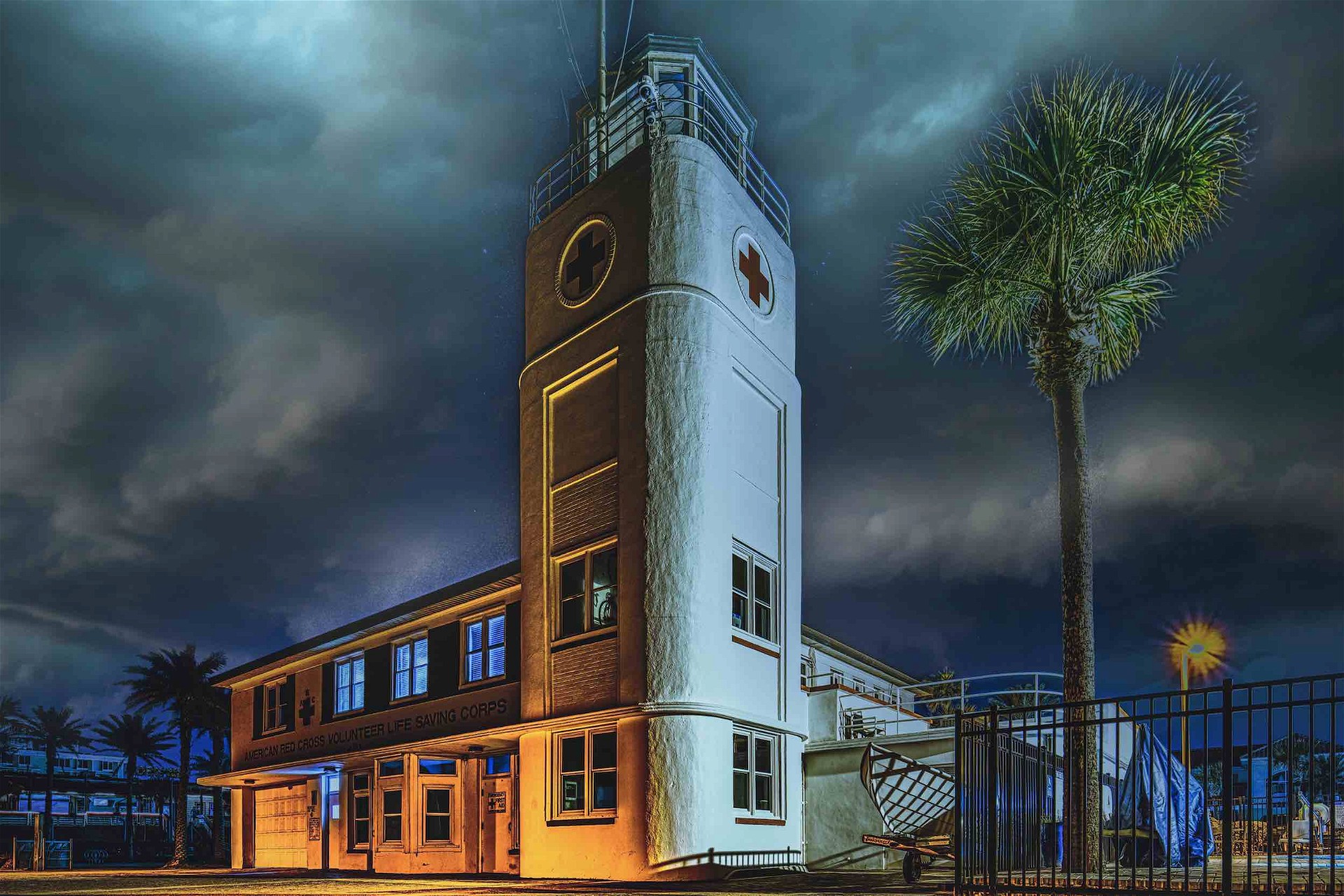
Life-Saving Station No. 1 is an iconic landmark in the Jacksonville Beach scenery. Its trademark Red Cross tower watches over the beach like a beacon of hope. Before its foundation in 1912, beachgoers at Pablo Beach, as Jacksonville Beach was once known, swam at their own risk. Strong riptides and inexperienced swimmers lost their lives to the fury of the ocean.
The Life Saving Corps of Pablo Beach was founded in 1912, and the station was built the following year. In the later years, it was almost treated as a hospital. But as any good doctor knows, you can’t save them all. Many victims of drowning passed away in the Lifeguard Station. Their restless spirits now roam the building, striking terror in those that dare to enter at night.
Quick Facts:
Florida’s European history stretches back so far that it has been lovingly called “The First Coast.” The beaches and sunshine that attract visitors today have always acted as a beacon for those hungry for relaxation. In 1562 the French Huguenot explorer Jean Ribault charted the St. Johns River that runs through the center of the state. Two years later, the first European settlement, Fort Caroline, was established.
The Spanish controlled the area since 1565, with a brief period of British rule between 1763 and 1783. Jacksonville was first settled in 1791 by English settlers pushing the boundaries of English colonial territory. It was referred to as Cowford due to the large number of bovines crossing the nearby St. Johns River.
By 1822 the newly founded United States had officially gained control of Florida, and the state’s reputation as a popular vacation destination had begun. The warm weather and pristine beaches attracted Americans from colder climates. A population boom occurred in the early 1900s due to these perfect conditions, and the state went from a largely agricultural area to a place to get away from it all.
The first official beach resort town was called Ruby. Established in 1884, the town was named after the daughter of railroad surveyor W. E Scully. The addition of the railroads allowed more and more people to flock to Flordia’s beautiful beaches. Renamed San Pablo in 1886, the small beach community had become a bustling tourism and recreation center by the early 20th century.
Many of these “bathers” were unprepared for the dangerous waters of the Atlantic. Riptides pulled both experienced and inexperienced swimmers out to see where many drowned. In 1912 the Volunteer Life Saving Corps of San Pablo was founded to prevent further incidents.
On April 6th, 1913, their first official station, a small wooden structure large enough for two boats, was constructed. The station was manned by a group of volunteers and laid the foundation for lifeguard stations across the United States.
Storm activity and poor construction quickly laid waste to the original building, and in 1920, a second concrete building was raised. It featured a large pirate ship-like lookout tower that was lovingly referred to as “The Peg.”
In 1948 the third building was constructed with a five-story tower adorned with the Red Cross logo. This station operated as a hospital in its early days. Many lost their lives here in drowning incidents or from other non-beach-related injuries.
Their spirits are still extremely active, making it one of those most haunted spots in North Florida.
Shadow figures are seen by lifeguards who reside overnight, a tradition that dates back to the early days of the volunteer corps. Multiple figures inhabit the station, likely victims of drowning that did not make it through. They creep across the walls and are sometimes seen through the windows from the outside.
Various EVP recordings have picked the voice of a spirit named Todd. One of the most distinct recordings to come through was the words “drowning is a killer of people.” While Todd’s true identity remains a mystery, it is very likely he died due to drowning.
Todd’s spirit is not the only one lingering around the building but seemingly the only one willing to communicate. The lifeguard station still stands as a monument to safety and organization, saving lives in the modern day. But sadly, not all lives can be saved; the spirits inside can testify to that.
If you’d like to get in touch with Todd or the other spirits inside Jacksonville Beach’s Life Saving Station No.1, we recommend trusting the professionals. Our experienced tour guides will take you all around Jacksonville to discover the most terrifying tales of life and death.
Not up to visiting Florida? Read about Jacksonville’s most haunted locations from your home on our blog! We cover most major American cities and provide you with the most in-depth information about hundreds of haunted locations.
Follow us on Facebook, Instagram, and Tik Tok for up spooky content delivered right to your phone!
Sources:
https://www.hauntedplaces.org/item/jacksonville-beach-lifeguard-station/
https://www.visitjacksonville.com/blog/lifesaving-landmark-at-the-beach/#:~:text=On%20April%206th%2C%201913%2C%20Life,Railroad.
https://www.beachesmuseum.org/jacksonville-beach-american-red-cross/
https://www.florida-backroads-travel.com/history-of-jacksonville-florida.html#:~:text=The%20first%20settlement%20near%20what,was%20renamed%20for%20Andrew%20Jackson.
https://usghostadventures.com/haunted-cities/top-10-most-haunted-places/most-haunted-locations-jacksonville/